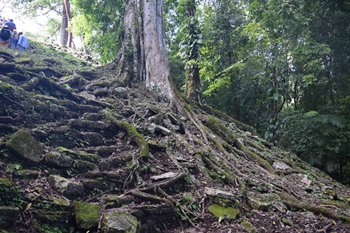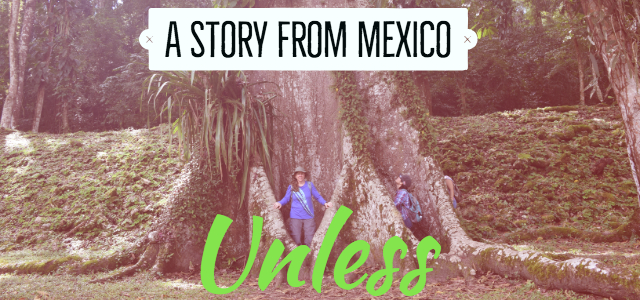UNLESS
“At the far end of town where the grickle grass grows and the wind smells slow and sour when it blows, is the land of the lifted Lorax…” I can write from memory these words that open Dr. Seuss´s book The Lorax. I read the story every Friday morning to the children at the School of Environmental Education in Texas for three years, and yet I never tire of the crazy rhymes and the sad story of how the old Oncler, because of his unabated greed, brought destruction to the land of the Truffula trees. As the story progresses, the Lorax tries to warn the Oncler, to no avail, of how his production of Thneeds is contaminating the air, soil, and water. Finally, the last Truffula tree is cut and the whole web of life is unraveled. Nothing can live in the wasteland left behind. As I see the story of the Oncler repeated over and over again throughout Chiapas, southern México, I wonder if we will heed the warnings before it is too late.
Here at the Institute of Intercultural Studies and Research, a long time Global Ministries partner, we work with people in villages and communities learning together how the death of the forests means more than the loss of trees. Every breath that we have ever breathed has depended on the oxygen processed by billions of leaves around the world. The food we eat comes from the soil enriched by those same leaves, naturally composted over hundreds of years, and held in place by grasping roots and staunch trunks that protect from the eroding forces of wind and rain. Thousands of manufactured goods were born from tree seedlings: houses, tools, furniture, pencils, and even the pages of books. The forest habitat is home to creatures known and unknown and to many humans; no one knows how many insects and plants are yet to be discovered in the Lacandón rainforests of southern Mexico and northern Guatemala. Humans depend daily on the medicines, food, and fuel for cooking and heating produced by trees.
 The Mayan people are reminding themselves of the wisdom of a simple life rooted in the natural rhythms which guided their grandfathers and grandmothers. Together we recognize that the loss of the forests is more than just a material, physical, or economic loss. It represents also a profound spiritual loss. Throughout time, people have retreated to the forest seeking in the solitude and music of birds, wind, insects, and water the whisper of the God of creation and of their own souls. Trees have been the subjects and settings for poems, paintings, plays, stories, and sculptures. In their towering majesty and profound stability, trees somehow bridge for humanity the distance between heaven and earth. Trees, like the giant cieba, sacred to the Mayan people, are the ancients who hold the secret wisdom of the ages in the rings of their hearts and link the history of humanity and the world with present and future. The death of the forests could very well mean the death of humanity.
The Mayan people are reminding themselves of the wisdom of a simple life rooted in the natural rhythms which guided their grandfathers and grandmothers. Together we recognize that the loss of the forests is more than just a material, physical, or economic loss. It represents also a profound spiritual loss. Throughout time, people have retreated to the forest seeking in the solitude and music of birds, wind, insects, and water the whisper of the God of creation and of their own souls. Trees have been the subjects and settings for poems, paintings, plays, stories, and sculptures. In their towering majesty and profound stability, trees somehow bridge for humanity the distance between heaven and earth. Trees, like the giant cieba, sacred to the Mayan people, are the ancients who hold the secret wisdom of the ages in the rings of their hearts and link the history of humanity and the world with present and future. The death of the forests could very well mean the death of humanity.
Yes, the forests are dying, and their dying is a warning of what is to come.We have transgressed the principles by which creation was founded and so we have snatched away its life sustaining potential. How can a river polluted with all kinds of toxic substances praise the Creator? How can the birds sing their praises if they fall motionless to the earth due to air pollution? How can the soil give food if it is full of artificial pesticides and fertilizers which rob it of its natural nutrients? Humanity has opened a chasm that separates creation from its Creator. We are the ones warned about in Revelation 11:18. We are the ones who will be judged, for we are “those who destroy the earth.”
“So, ‘catch’ calls the Oncler, and he lets something fall. It is the very last Truffula seed of them all.” The Lorax ends with the puzzling word “unless” and a challenge to every reader. We all have the last of the Truffula seeds in our hands. “Unless” each of us chooses to plant the seeds and grow back the forest, “unless” we look at the world from a different perspective and change our priorities, habits, and expectations, “unless” we as individuals and as a society learn to care for our home, the earth, “unless”…
Elena Huegel serves with the Intercultural Research and Studies Institute (INESIN) in Mexico. Her appointment is made possible by your gifts to Disciples Mission Fund, Our Church’s Wider Mission, WOC, OGHS and your special gifts.

